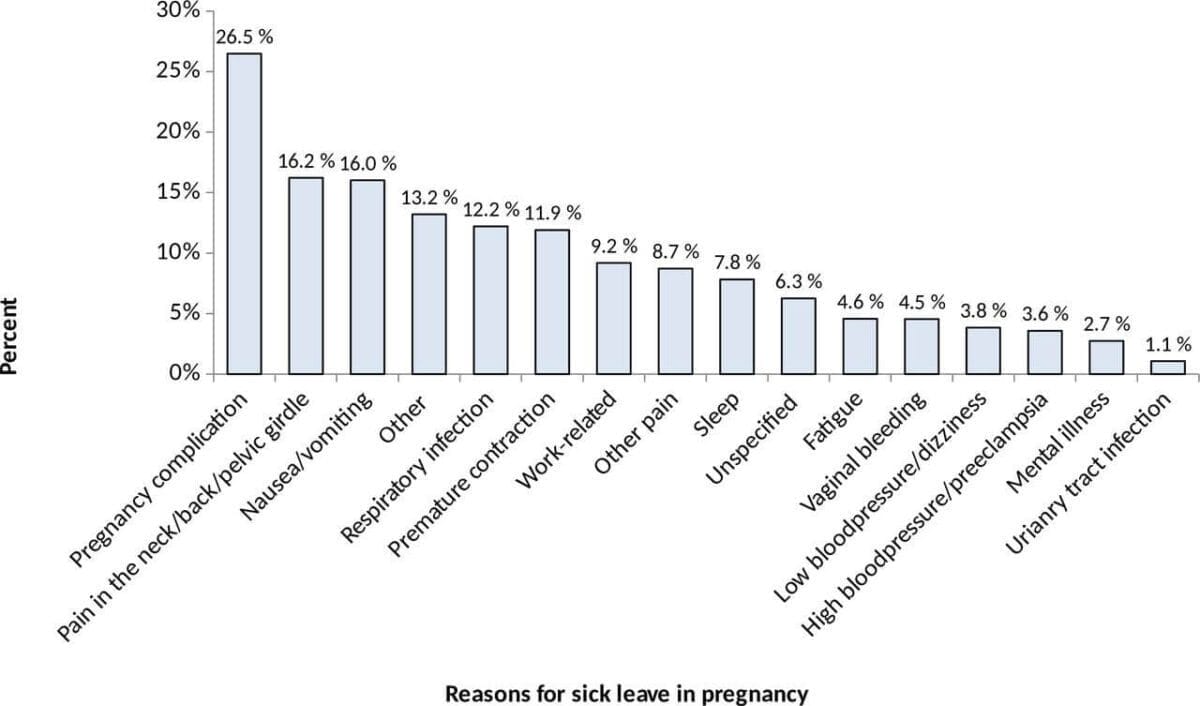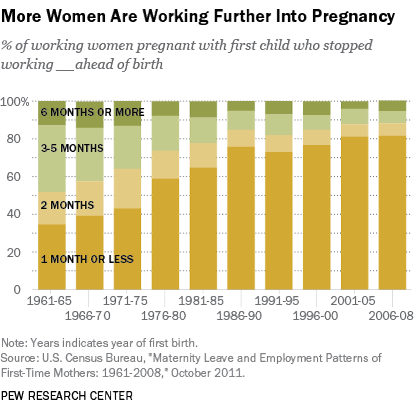Pregnancy is tough! Especially if you are a working mother.
Recent studies on 508 employed pregnant mothers show:
- 56% of employed pregnant women call in sick in the first 32 weeks of pregnancy.
- 1 in 4 employed pregnant women took long-term sick leave of >20 days.
- Lower back pain is the most common reason for calling in sick.
Often, women who are pregnant need to call in sick and may have to miss work at the last minute due to many different reasons.
Studies have shown, there are a few reasons more common than the rest.
| No | Reasons | Percentage |
|---|---|---|
| 1 | Pregnancy Complication | 26.5% |
| 2 | Pain in the neck, back, pelvic girdle | 16.2% |
| 3 | Nausea, Vomiting | 16.0% |
| 4 | Respiratory Infection | 12.2% |
| 5 | Premature Contraction | 11.9% |
| 6 | Work-Related or Work-Stress | 9.2% |
| 7 | Sleep Deprivation | 7.8% |
| 8 | Fatigue or Tiredness | 4.6% |
| 9 | Vaginal Bleeding | 4.5% |
| 10 | Low Blood Pressure Dizziness | 3.8% |

Read also: How to deal with pregnancy discrimination at work!
Good Reasons For Sick Leave During Pregnancy
Before calling in sick, you may want to check with your human resource department on your company’s policy.
Most companies have policies that will align with the Pregnancy Discrimination Act (PDA), which will help pregnant employees at work.
Here are some commonly accepted reasons for calling in sick during pregnancy.
1. Back pain or any pregnancy-related medical conditions
Back pain is one of the most common medical conditions that a pregnant employee may have.
It is totally understandable that a pregnant mother will go through some sort of discomfort during the period of her pregnancy.
But when the discomfort becomes unbearable or even health threatening, it will be best if you can call in sick and seek medical help immediately.
You might be pleasantly surprised that Pregnancy Discrimination Act (PDA) states:
“Employer forbids discrimination based on pregnancy when it comes to any aspect of employment, including hiring, firing, pay, job assignments, promotions, layoff, training, fringe benefits, such as leave and health insurance, and any other term or condition of employment.”
Pregnant worker are protected at work.
2. Contagious illness
Fever? Cough? Running Nose?
Contagious illness can be pretty scary.
First, there was only one colleague who is not feeling well, then you see a few, and finally, almost everyone around you is coughing or had a runny nose.
If you are having a contagious illness, just call in sick and stay at home.
Some of the common contagious illnesses are:
- Common Cold
- Stomach Flu
- Influenza
- Pink Eyes
- Strep Throat
- Whooping Cough
- Hand, Foot Mouth Disease (HFMD)
- Covid-19
Not only calling in sick will protect your coworkers and customers, but sufficient rest can also help you recover faster.
Preventing the spread of sickness is just one way of being a responsible and respectful coworker.
If you are unsure if you should call in sick, you can take this short quiz to know your answer.
3. Medical Appointment
Periodic pregnancy health check-up is important. The pregnant mother does routine health checkups to have peace of mind to know that her baby is doing “OK”.
A prenatal check-up is usually required every few weeks. And booking the check-up is usually not easy.
Expected frequency of prenatal visits:
- Pregnancy at 0 to 26 weeks: Once every four weeks
- Pregnancy at 26 to 32 weeks: Once every three weeks
- Pregnancy at 32 to 36 weeks: Once every two weeks
- Pregnancy at 36 weeks to delivery: Once every week
Some companies allow you to use sick days to attend non-emergency pre planned doctor appointments.
What if sick leave is not allowed for preplanned doctor appointments?
Take unpaid leave.
Family and Medical Leave Act (FMLA) entitles you to take twelve weeks of unpaid leave in a 12-month period.
FMLA will apply if you are working at:
- Public agencies; Local, State, and Federal employers, and local education agencies
- Private-sector employers who employ 50 or more employees
With FMLA, you will be entitled to unpaid, job-protected leave with the continuation of group health insurance coverage.
FMLA protects you from common workplace discrimination experienced by expectant mothers.
4. Injury
The most workplace will consider any condition that makes you unable to perform your job as a reasonable reason for sick leave.
A few of the common injuries that may result in a sick leave are:
- Slips, trips, and fall
- Ankle sprain
- Muscle strains
- Knee injury
- Tennis elbow
- Crashes and collisions
- Cuts and lacerations
- Inhalation of toxic fumes
If the condition persists and your doctor requires you to rest, you can consider taking recovery time by taking sick leave.
If you’re injured, most managers will rather you leave work early, or concentrate on your recovery at home, than come to work.
You are responsible of your own well-being. If unwell, don’t over exert yourself.
5. Pre-Existing Diagnosed Medical Condition
The human resource department is usually notified about your pre-existing medical condition during your onboarding. Some medical conditions may require regular medical checkups or appointments.
Here are some common pre-existing medical conditions:
- Cancer
- Diabetes
- Lupus
- Epilepsy
- Depression
- Asthma
- Acne
- Pregnancy
Clear documentation from a medical professional should always be provided to your employer.
You may want to discuss flexible work options or even opt for working from home for some of the days if your job permits.
You can check out some of the tips on work-from-home for working moms if that helps.
6. Hospitalization
In cases, where your hospital stay is extended beyond your sick leave allowance, your workplace may provide hospitalization leave or offer unpaid leave for your recovery.
Example of where hospitalization may be required:
- Accident
- Cancer
- Infection
- Pneumonia
- Heart diseases
- Acute upper respiratory infections
- Obstetric complications
The family and Medical Leave Act (FMLA) can be used to cover your extended absence from work for up to 12 weeks in a period of 12 months.
Alternatively, you can discuss your extended leave options with your human resources department
7. Delivery
Studies have shown that most standard working conditions present little to no danger to maternal or child health. A pregnant employee with an uncomplicated pregnancy is allowed to continue working for as long as she chooses.

Having said that, I am not encouraging you to tough out contractions and risk an in-office birth.
Calling out sick due to your pregnancy or even possible delivery is totally acceptable reason for sick leave!
In fact, pregnant employees can use the Family and Medical Leave Act (FMLA) for absences related to their pregnancy.
How To Call In Sick
Asking for sick leave or leaving work early can sometimes be quite troublesome. You are tired, dizzy and maybe feeling confused.
But it is important for you to convey your message to your employer clearly.
Calling in for a sick day should include the following information:
- What reason for calling in for sick leave?
- What responsibilities are required to be covered when you are on leave?
Usually, employees ask for sick leave in 2 different ways:
- Calling on the phone
- Sending a text message
Example of what to say when you call in sick on a phone
“Hi [Employer], I woke up today feeling very dizzy, and I think I’m having a fever.
I am worried it will get worst and I don’t want to infect my colleagues.
I think it will be best for me to take a day off and rest.
Should be able to complete my [Task] when I am back tomorrow.
I’ll try to be on email as much as possible.”
Example of what to text your boss to call in sick
“Hello [Manager], I am having very bad back pain and my doctor has recommended me to take [No. of days] days off work to recover.
I hope I will be well enough to return to work on [Date].
I’ve texted [Your Colleague] with the things he/she may need to do in my absence.
I will be available by email for any pressing needs. Thanks.”
Up Next… Surprising Facts to know about Pregnancy Discrimination at Work
“How does sick pay work?”
Check out this video below!
Want to learn future-proof skills?
We’ve handpicked some of the most popular online courses you might be interested in. Click the online courses below to find out more.
| IT | Business | Others |
|---|---|---|
| Web Development | Entrepreneurship | Graphic Design & Illustration |
| Mobile Development | Business Analytics & Intelligence | IT Certification |
| Game Development | Digital Marketing | Personal Transformation |
Like this post? Come let us know in the comments below!
Wait a minute…
Do you want to join a conversation?
Join other high achievers like you at “Our Career Forum“
Read Also:
Join over 11,000+ achievers who are committed to achieving their career goals!






